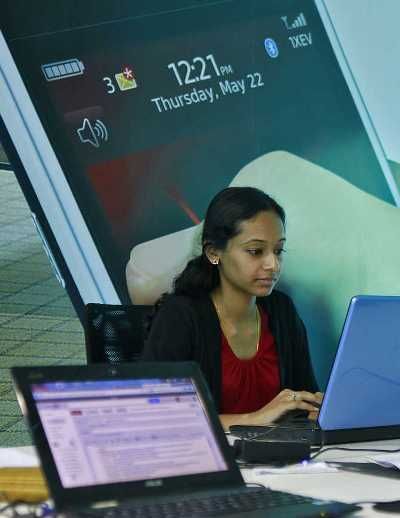 Dissenting voices appear over the perception of the internet as a driver of growth, says Ajit Balakrishnan
Dissenting voices appear over the perception of the internet as a driver of growth, says Ajit Balakrishnan
This is not how it is supposed to happen in a country where the internet, smartphones and hot apps have been all pervasive for the past decade: US labour productivity, a measure of how much output you achieve per hour of work, declined during the first quarter of 2016.
That is to say, every American (excluding farm workers) had to work more hours to achieve the same output.
Our belief and faith in technology since the Industrial Revolution has been technology's magical power to help humans achieve more for the same amount of work, be it spinning yarn, weaving cloth, transporting people or cooking our dinner.
We love this because you can use that extra time to do more work and earn more or just have fun. Looked at from another angle, this additional productivity that technology provides allows employers to pay their workers more per hour because of the extra output achieved.
This statistic of US productivity decline had led to much speculation.
It must be because of all those young people in offices spending most of their time sending text messages to their friends and making social media postings instead of working, say the techno-sceptics, who in any case had not laid much store on these devices and apps as productivity enhancing innovations.
Others blame falling educational standards, which do a poor job of imparting job-related skills and attitudes.
Others, outside America, raise the question, if the internet and related innovations have not resulted in productivity increase in America where the internet is affordable and used by practically the whole population, what is in store for countries like India, where the internet reaches barely a tenth of the population?
Is the internet just a fun thing to do like TV and radio and not really a cornerstone of future economic growth and prosperity as we imagined it to be?
What is even more unsettling is that the productivity decline just reported is the fourth such decline in the past six quarters.
And, looking farther back, it is part of nearly a decade of poor productivity growth in America, which some thinkers predict will have profound effects on American society because of the accompanying side effects: wages not growing for a decade or more leading to falling living standards and, hold your breath, the rise of populist politicians who then blame “outsiders”, imports, people of other religions, and so on.
There is even a well-regarded book by a Northwestern University economics professor Richard Gordon, The Rise and Fall of American Productivity, which cautions against excessive techno-optimism.
Prof Gordon has for a long time argued that the information technology breakthroughs of our time are not of the same level as the Five Great Inventions of the 1870 to 1970 period: electricity, sanitation in cities, chemicals, the internal combustion engine and the telephone.
He even sees those inventions and the prosperity they generated as probably a one-time event, not to be seen again, and predicts a future of falling living standards!
What makes all this intriguing is that scholars have not yet fully deciphered the complex ways technologies and societies interact with each other.
Take, for example, the path through which e-commerce is working its way through Indian society.
By far the largest category of goods transacted in India's e-commerce is mobile phones and accessories.
These typically start out in a Chinese factory, from which wholesale importers in India buy it, add a three to five per cent margin and sell it to, for example, a state-level distributor for Maharashtra, who in turn adds a three to five per cent mark-up and sells it to a city-level distributor, say, in Pune.
This distributor in turn adds a mark-up of three to five per cent and sells it to a shop in Pune, which then adds a mark-up of three to five per cent and sells it to you and me.
When an e-commerce player enters this scene, it procures this stuff directly from the Chinese factory, saving itself the 12-20 per cent margin that the intermediaries in the chain enjoy and sells it directly to you and me through its e-commerce website at a price 10-15 per cent lower than we would get from a normal shop.
Whether this “disintermediation”, the elimination of multiple intermediaries, is a good thing or a bad thing depends on which side of the social and economic fence you sit on.
As a consumer, you love the savings, as an economist you love the idea of more being accomplished with lesser human beings (that is after all “productivity”), but if are one of these intermediaries, you will howl with outrage at your means of living being taken away from you.
India being India, there is an additional twist to this tale: the total value of all these mobile phones and similar electronic stuff imported into India in a year is about $ 50 billion, so the amounts that are distributed throughout these chain of intermediaries is about $6-8 billion, and so, these "intermediaries" are very well-to-do folks indeed and are big investors in real estate and have strong links to political parties.
How fast and deep e-commerce penetrates in India is going to depend on which of these forces play out.
Prof Gordon, in his book, provocatively asks us to choose between two options: with one option you keep 2002 electronic technology, including your Windows 98 laptop and you can keep your running water and indoor toilet, but you can’t use anything invented since 2002.
With the other option you get everything invented in the past decade, including social media, your smartphone with 4G connection, but you have to give up running water and indoor toilets.
“You have to haul the water into your dwelling”, he says, “and carry out the waste.
"Even at 3 am on a rainy night, your only toilet option is a wet and perhaps muddy walk to the outhouse.
"Which option would you choose?”
The perplexing productivity statistics that have been reported in America, and which may start appearing in other countries as well, may be the result of such complex choices that individuals and groups within a society make when faced with technological innovation.
Image: An employee in the start-up village in Kinfra High Tech Park in Kochi, Kerala. Photograph: Sivaram V/Reuters.
Image has been used for representational purpose only.
Ajit Balakrishnan, the founder and CEO of rediff.com, is the author of The Wave Rider: A Chronicle of the Information Age. You can reach him at ajitb@rediffmail.com.













 © 2025
© 2025